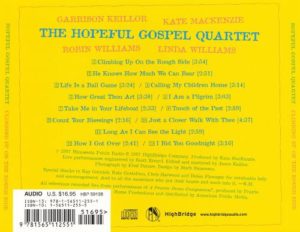It’s been a hectic three months and I have thought often of the Mormon hymn I heard The Hopeful Gospel Quartet sing on A Prairie Home Companion a few years ago. It’s a hymn I’ve had great affection for from childhood because it was so mysterious. I could never quite understand what it meant to be tempest tossed upon life’s pillows. The only thing I could figure out was that in this case a pillow must be something like a sleeping bag unzipped and held on each of the four corners and maybe in the middle by older cousins at a family reunion and they would toss the younger cousins up and down. I thought that would be fun. So why would you be discouraged, thinking all was lost?
 Well, hearing The Hopeful Gospel Quartet sing that was not the first time I had been moved to think about the influence of Mormon hymns on the greater Christian world. Years earlier, on my mission, I came across an Evangelical tract that said,
Well, hearing The Hopeful Gospel Quartet sing that was not the first time I had been moved to think about the influence of Mormon hymns on the greater Christian world. Years earlier, on my mission, I came across an Evangelical tract that said,
As the hymn says, there was no other good enough to pay the price of sin.
He only could unlock the gates of Heaven and let us in.’
Think for a minute about all those stories you’ve heard about congregations gathering to pray and study the Bible and pray for messengers from the Lord, for example, those Wilford Woodruff met at Benbow Farm. They were Protestant, and they brought with them their music, their worship style, their interpretive style from hundreds of years of asking questions about scriptural texts.
And there’s a lot we can learn from them. At the same time a lot of the Protestant exegetical style is tied to a closed canon, to the rejection of additional revelation. That’s not to suggest that Protestants devalue or deny the workings of the Holy Spirit in the church as a way of guiding members. But that working of the Holy Spirit does not have the authority of scripture. The Holy Spirit does not add to the body of scriptural knowledge, or rather, does not add to the body of scripture itself.

That’s very different from Joseph Smith’s experience of asking questions about the scriptures, or doctoral questions, or questions about how to apply the scriptures, and then gathering the answers into a work of scripture like the Doctrine and Covenants.
Consider this dialogue that most us have probably participated in at some time or another, especially if we have served a mission:
A: Where is this doctrine of baptism for the dead taught in the Bible?
B: Paul comments on it in 1 Corinthians 15:29, “Else what shall they do who are baptized for the dead if the dead rise not at all? Why are they then baptized for the dead?”
A: If it’s all in the Bible, why do you need a new revelation?
B: Because it’s not taught fully and in detail. Paul’s audience, who were reading the letter, already understood and he didn’t have to elaborate—didn’t have to explain. On the other hand, we don’t practice baptism for the dead, so we need more detail.
A: Well, if it’s not practiced now, it must be because the Lord doesn’t want it practiced. Just because Paul mentioned it doesn’t mean he was teaching it. Bible prophets mention idolatry all the time, but that doesn’t mean they were teaching it.
(B realizes it was a trick question, that if she had said it wasn’t in the Bible, A would have said, “If it’s not in the Bible, why would God want it taught?” but being young and foolhardy, she decides to press on.)
B: There are many things not fully explained in the Bible. Some teachings were left out by people who didn’t want them taught, and some were removed.
A: Do you really believe JEHOVAH GOD ALMIGHTY WOULD ALLOW HIS HOLY WORD TO BE TREATED THAT WAY?
B: Well, he allowed the King to command Jehudi to burn Jeremiah’s writings, then he commanded Jeremiah to write it all down again, and add more to it. The Lord can always reveal something over again.
A: You miss the point of that story. The restoration of Jeremiah’s scriptures was immediate. The Lord didn’t wait a thousand years after Jeremiah’s work had been published to the world to correct it. If there was any correction done, it was while the scriptures were being written. The Lord put his seal on the scriptures:
18 For I testify unto every man that heareth the words of the prophecy of this book, If any man shall add unto these things, God shall add unto him the plagues that are written in this book:
19 And if any man shall take away from the words of the book of this prophecy, God shall take away his part out of the book of life, and out of the holy city, and from the things which are written in this book.
B: That only applies to the Book of Revelation. The scriptures weren’t edited into a single book for a long time after Revelation was written.
A: God knew it would be the last book in the Bible, and He put that statement there to seal the Bible.
B: Men can’t add to the scripture, but God can, and has.
A: But why would He need to? Truth is absolute. Truth doesn’t change. If He’s given it out once he doesn’t need to give it out again.
B: I agree that truth is consistent with itself. Additional scripture adds to our knowledge. It’s not meant to replace the old scripture.
A: So you believe that God allowed people to tamper with scripture then waited 1800 years to correct the mistakes? Does that sound compassionate? What kind of a God would let his people wander in error for so long? I warn you, you are playing with fire, Hellfire.

These two women are not so far apart as they think they are. They share a common love of the scriptures and the Savior, a common testimony of the Atonement. There are a lot of ways they could break down their barriers, like sharing a meal together, serving each other, sharing their testimonies, expressing their love for each other and the Savior.
We’ll leave them to figure out how to do that. My interest here is in what they both have in common with atheists, which we’ll see in the next post, recasting the dialogue as between a Mormon and an atheist. Should be soon. Life’s pillows are a little calmer now, and that pillow for sitting on is much more comfortable for my wife.
Your turn (finally).
Featured image by Sylvie Tittel
